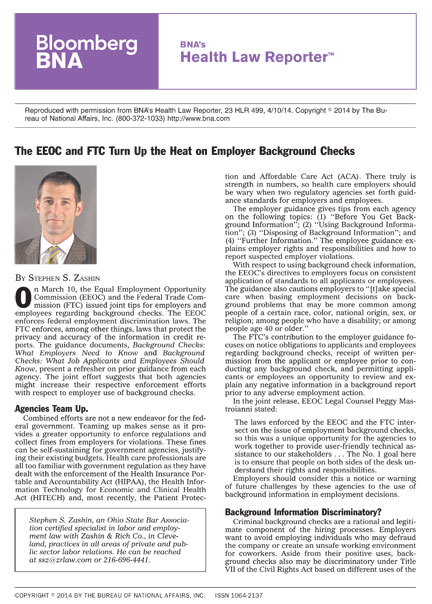
Z&R Press
Press and Media
Law360
Mocktails Seen As Key Ingredient For Holiday Party Inclusivity
November 8, 2023
Cleveland Metropolitan Bar Journal
Women in Law
April 2020
Smart Business Cleveland
2017 Smart Business Family Business Achievement Awards
September 2017
Crain's Cleveland Business
Ohio Employers Confront Marijuana Use
July 22, 2017
Sports Illustrated
Lane Johnson's Bold Move To Sue His Own Union Is Rare, But Not Unprecedented
January 11, 2017
Law360
Packers Player Drops NFL Drug Suspension Dispute
December 19, 2016
Sports Business Daily
NFL, NFLPA Appoint Das As Third Arbitrator In Michael Pennel Lawsuit
December 5, 2016
Sports Business Journal
Eagles Lineman Challenges NFL and NFLPA in NLRB Filings
December 5, 2016
Law360
Eagles Lineman Says Suspension Violates Federal Labor Law
November 29, 2016
The Business of Sports with Andrew Brandt
RTAB #30: Lane Johnson's Legal Team (Audio Interview)
November 29, 2016
BNA's Health Law Reporter
Surprise! The NLRB Says You Just Might Be a 'Joint Employer'
September 24, 2015
BNA's Health Law Reporter
NLRB Adopts New Joint Employer Standard; Ruling Could Affect Health-Care Industry
September 3, 2015
BNA's Health Law Reporter
Challenge to NLRB Election Rule Fails; Employers Urged to Prepare New Game Plan
June 11, 2015
American Bar Association Section of Labor and Employment Law
Member Spotlight: George S. Crisci
April 13, 2015
Crain's - Article and Video
Zashin & Rich embraces Cleveland roots and rock 'n' roll heritage
November 16, 2014
BNA's Health Law Reporter
Justices Reject NLRB Recess Appointments; Significant Health Care Decisions in Limbo
July 10, 2014
BNA's Health Law Reporter
The EEOC and FTC Turn Up the Heat on Employer Background Checks
April 2014
Crain’s
Zashin & Rich move marks big milestone
for E&Y Tower
November 2013
Cleveland.com
Zashin & Rich law firm leases last full floor of Ernst & Young Tower at Flats East Bank project
November 2013
CCH Employment Law Daily
NLRB NEWS - Controversy Erupts Over NLRB Recess Appointments
January 2012
Crain’s
Companies should consider coverage against employee-related claims
By Stephen Zashin | July 2004
Crain’s
ADR programs can save dollars and time
By Stephen Zashin | November 2003
COSE Update: Legal Ease
One Size Does Not Fit All
(Employment Practices Liability Insurance)
By Stephen Zashin
COSE Update: Legal Ease
Noncompete Agreements
By Michele Jakubs
COSE Update: Legal Ease
Ohio's 'Baby COBRA' Law
By Helena Oroz
BNA's Health Law Reporter™
The EEOC and FTC Turn Up the Heat on Employer Background Checks
April 10, 2014 | By Stephen S. Zashin | Download PDF
Reproduced with permission from BNA's Health Law Reporter, 23 HLR 499, 4/10/14.
Copyright 2014 by The Bureau of National Affairs, Inc. (800-372-1033)

On March 10, the Equal Employment Opportunity Commission (EEOC) and the Federal Trade Commission (FTC) issued joint tips for employers and employees regarding background checks. The EEOC enforces federal employment discrimination laws. The FTC enforces, among other things, laws that protect the privacy and accuracy of the information in credit reports. The guidance documents, Background Checks: What Employers Need to Know and Background Checks: What Job Applicants and Employees Should Know, present a refresher on prior guidance from each agency. The joint effort suggests that both agencies might increase their respective enforcement efforts with respect to employer use of background checks.
Agencies Team Up.
Combined efforts are not a new endeavor for the federal government. Teaming up makes sense as it provides a greater opportunity to enforce regulations and collect fines from employers for violations. These fines can be self-sustaining for government agencies, justifying their existing budgets. Health care professionals are all too familiar with government regulation as they have dealt with the enforcement of the Health Insurance Portable and Accountability Act (HIPAA), the Health Information Technology for Economic and Clinical Health Act (HITECH) and, most recently, the Patient Protection and Affordable Care Act (ACA). There truly is strength in numbers, so health care employers should be wary when two regulatory agencies set forth guidance standards for employers and employees.
The employer guidance gives tips from each agency on the following topics: (1) ''Before You Get Background Information''; (2) ''Using Background Information''; (3) ''Disposing of Background Information''; and (4) ''Further Information.'' The employee guidance explains employer rights and responsibilities and how to report suspected employer violations.
With respect to using background check information, the EEOC's directives to employers focus on consistent application of standards to all applicants or employees. The guidance also cautions employers to ''[t]ake special care when basing employment decisions on background problems that may be more common among people of a certain race, color, national origin, sex, or religion; among people who have a disability; or among people age 40 or older.''
The FTC's contribution to the employer guidance focuses on notice obligations to applicants and employees regarding background checks, receipt of written permission from the applicant or employee prior to conducting any background check, and permitting applicants or employees an opportunity to review and explain any negative information in a background report prior to any adverse employment action.
In the joint release, EEOC Legal Counsel Peggy Mastroianni stated:
The laws enforced by the EEOC and the FTC intersect on the issue of employment background checks, so this was a unique opportunity for the agencies to work together to provide user-friendly technical assistance to our stakeholders . . . The No. 1 goal here is to ensure that people on both sides of the desk understand their rights and responsibilities.
Employers should consider this a notice or warning of future challenges by these agencies to the use of background information in employment decisions.
Background Information Discriminatory?
Criminal background checks are a rational and legitimate component of the hiring processes. Employers want to avoid employing individuals who may defraud the company or create an unsafe working environment for coworkers. Aside from their positive uses, background checks also may be discriminatory under Title VII of the Civil Rights Act based on different uses of the information against individuals in protected categories (''disparate treatment''), or for the negative or ''disparate impact'' any background check policy might have on such individuals. The ''disparate treatment'' form of discrimination can be easily prevented by using background information uniformly in making employment decisions.
Even without proof of disparate treatment, background check policies, while facially neutral, may at the same time have a discriminatory effect or disparate impact on protected individuals. See 42 U.S.C. § 2000e- 2(k)(l)(A)(i). ''Disparate impact'' claims require statistical evidence that a hiring practice or policy negatively impacts an individual in a protected category. The U.S. Supreme Court has determined that a disparate impact occurs when a facially neutral policy provides ''statistical evidence of a kind and degree sufficient to show that the practice in question has caused the exclusion of applicants for jobs or promotions because of their membership in a protected group,'' Watson v. Fort Worth Bank & Trust, 487 U.S. 977, 994 (1988). If a disparate impact plaintiff sets forth sufficient statistical evidence to support a discrimination claim, then the employer must prove a ''business necessity'' that requires the use of the facially neutral policy in making employment decisions.
EEOC Disparate Impact Challenges to Background Checks.
In recent years, the EEOC has brought a number of claims to challenge the use of background checks through a ''disparate impact'' theory. However, the courts have pushed back, finding that while some specific uses of criminal and credit background checks may be discriminatory and violate Title VII, the EEOC still bears the burden of supplying reliable expert testimony and statistical evidence of ''disparate impact'' before a violation can be found.
In two such cases, the EEOC challenged the employer's use of credit information and criminal history received through a background check (EEOC v. Freeman, 961 F. Supp. 2d 783, 2013 BL 210284 (D. Md. 2013); EEOC v. Kaplan Higher Learning Education Corp., 2013 BL 21834 (N.D. Ohio Jan. 28, 2013). In both cases, the court rejected the EEOC's challenges, finding that the EEOC provided insufficient statistical evidence to prove any alleged disparate impact. The EEOC presented general statistical evidence, which incorporated and excluded certain data to support its position and that provided no direct correlation to any employment practice. The district courts found that the EEOC provided insufficient information to meet its disparate impact burden of proof. Both cases are on appeal.
The EEOC will learn from these early setbacks, and the recent joint guidance from the EEOC and the FTC reflects a renewed effort to challenge the use of background checks. The FTC can serve as another statistical support entity for the EEOC, creating statistical data on the use of credit history. The next time the EEOC pushes forward with disparate impact claims against an employer, it will likely attempt to remedy its prior failure to provide sufficient statistical support.
Health Care Employers Must Balance Hiring Responsibilities With Discrimination Concerns.
Each state has its own laws regarding criminal background checks, as well as licensing for health care professionals. Criminal records checks often are required prior to obtaining licensure or being hired to work in the health care industry. Such checks are used to determine if an employee or potential employee has a predisposition for dishonesty, theft, or violence against coworkers or patients. Similarly, health care employers regularly use credit history to ascertain whether applicants for certain employment positions are under financial stress or burdens that might compromise their obligations.
The reasons for background checks in the health care profession are obvious. Health care professionals have access to several forms of protected information (e.g., patient medical and financial information). Health care professionals also have unique access to individuals in vulnerable conditions and individuals with physical or mental limitations due to age, illness or injury. Conducting background checks helps employers ensure that dishonest or dangerous individuals are not employed in the health care industry and protects employers, employees and patients alike. Additionally, background checks can reduce an employer's liability regarding negligent hiring or retention claims.
Health care employers must balance effective management of their employees against the potential for ''disparate treatment'' and ''disparate impact'' claims based upon facially neutral policies. Without doubt, however, employers should evaluate whether their policies actually have a disparate impact on employees.
Stephen S. Zashin, an Ohio State Bar Association certified specialist in labor and employment law with Zashin & Rich in Cleveland, practices in all areas of private and public sector labor relations.
© 2014 BY THE BUREAU OF NATIONAL AFFAIRS, INC. HLR ISSN 1064-2137
